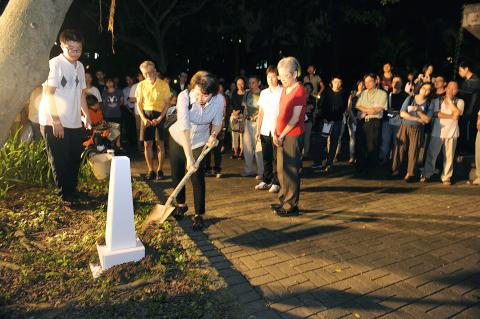More than 100 people gathered yesterday evening at National Taiwan University (NTU) in memory of former Carnegie Mellon University (CMU) assistant professor Chen Wen-cheng (陳文成), whose death 30 years ago remains a mystery to this day.
Chen, a graduate of NTU’s Department of Mathematics, went to study in the US and later became an assistant professor at CMU’s Department of Statistics.
He was called by the Taiwan Garrison Command — a military state security agency during the Martial Law era — for interrogation on July 2, 1981, when he returned to Taiwan to visit his family, because of his support for the pro-democracy movement.

Photo: George Tsormg,Taipei Times
On the morning of July 3, 1981, Chen’s body was discovered next to a library on the NTU campus and it was unclear whether his body was deliberately placed there to appear as though he had committed suicide or fallen off the building by accident.
The Garrison Command said they released Chen after the interrogation and that they had nothing to do with his death.
Thirty years later, what really happened that night remains a mystery.
“I am really thankful that so many of you students came out tonight to remember my brother and what happened 30 years ago,” Chen’s elder sister, Chen Pao-yueh (陳寶月), told the gathering of NTU students, friends and family members at the site where Chen’s body was found.
A documentary on Chen was also shown at the service.
“Some people may think what happened to my brother has nothing to do with them. Well, if no one pays attention to such things, one day, what happened to my brother may happen to you too, and by that time, you would regret that you didn’t care enough earlier,” she said.
She criticized the Chinese Nationalist Party (KMT) party for “not admitting to the bad things they have done,” and said that, at the age of 60, the only thing she cares about now is discovering the truth about Chen Wen-cheng’s death.
“[Chen Wen-cheng’s death] is something big that has happened on our campus. He was an NTU graduate as well, but the school never paid much attention to it and most of students don’t know about it, and we think this is not right,” said Lin Hsin-yeh (林欣曄), president of the NTU Graduate Student Association. “This is why we’ve organized this event to commemorate the 30th anniversary of Chen Wen-cheng’s death.”
She said the association, as well the undergraduate student organization NTU Student Association, would not only like more of their classmates to know about Chen Wen-cheng’s story, but also called on the school to erect an official memorial for him on the site where his body was discovered, and to record Chen Wen-cheng’s story into the school’s history.
The students made their own miniature memorial and placed it on the site where Chen Wen-cheng’s body was discovered, hoping that there would be an official one next year.
In addition to the on-campus memorial event, the Chen Wen-cheng Memorial Foundation will organize a concert in his memory tomorrow at 7:30pm at the Civil Service Development Institute in Taipei.

CHAOS: Iranians took to the streets playing celebratory music after reports of Khamenei’s death on Saturday, while mourners also gathered in Tehran yesterday Iranian Supreme Leader Ayatollah Ali Khamenei was killed in a major attack on Iran launched by Israel and the US, throwing the future of the Islamic republic into doubt and raising the risk of regional instability. Iranian state television and the state-run IRNA news agency announced the 86-year-old’s death early yesterday. US President Donald Trump said it gave Iranians their “greatest chance” to “take back” their country. The announcements came after a joint US and Israeli aerial bombardment that targeted Iranian military and governmental sites. Trump said the “heavy and pinpoint bombing” would continue through the week or as long

TRUST: The KMT said it respected the US’ timing and considerations, and hoped it would continue to honor its commitments to helping Taiwan bolster its defenses and deterrence US President Donald Trump is delaying a multibillion-dollar arms sale to Taiwan to ensure his visit to Beijing is successful, a New York Times report said. The weapons sales package has stalled in the US Department of State, the report said, citing US officials it did not identify. The White House has told agencies not to push forward ahead of Trump’s meeting with Chinese President Xi Jinping (習近平), it said. The two last month held a phone call to discuss trade and geopolitical flashpoints ahead of the summit. Xi raised the Taiwan issue and urged the US to handle arms sales to

State-run CPC Corp, Taiwan (CPC, 台灣中油) yesterday said that it had confirmed on Saturday night with its liquefied natural gas (LNG) and crude oil suppliers that shipments are proceeding as scheduled and that domestic supplies remain unaffected. The CPC yesterday announced the gasoline and diesel prices will rise by NT$0.2 and NT$0.4 per liter, respectively, starting Monday, citing Middle East tensions and blizzards in the eastern United States. CPC also iterated it has been reducing the proportion of crude oil imports from the Middle East and diversifying its supply sources in the past few years in response to geopolitical risks, expanding

Pro-democracy media tycoon Jimmy Lai’s (黎智英) fraud conviction and prison sentence were yesterday overturned by a Hong Kong court, in a surprise legal decision that comes soon after Lai was jailed for 20 years on a separate national security charge. Judges Jeremy Poon (潘兆初), Anthea Pang (彭寶琴) and Derek Pang (彭偉昌) said in the judgement that they allowed the appeal from Lai, and another defendant in the case, to proceed, as a lower court judge had “erred.” “The Court of Appeal gave them leave to appeal against their conviction, allowed their appeals, quashed the convictions and set aside the sentences,” the judges